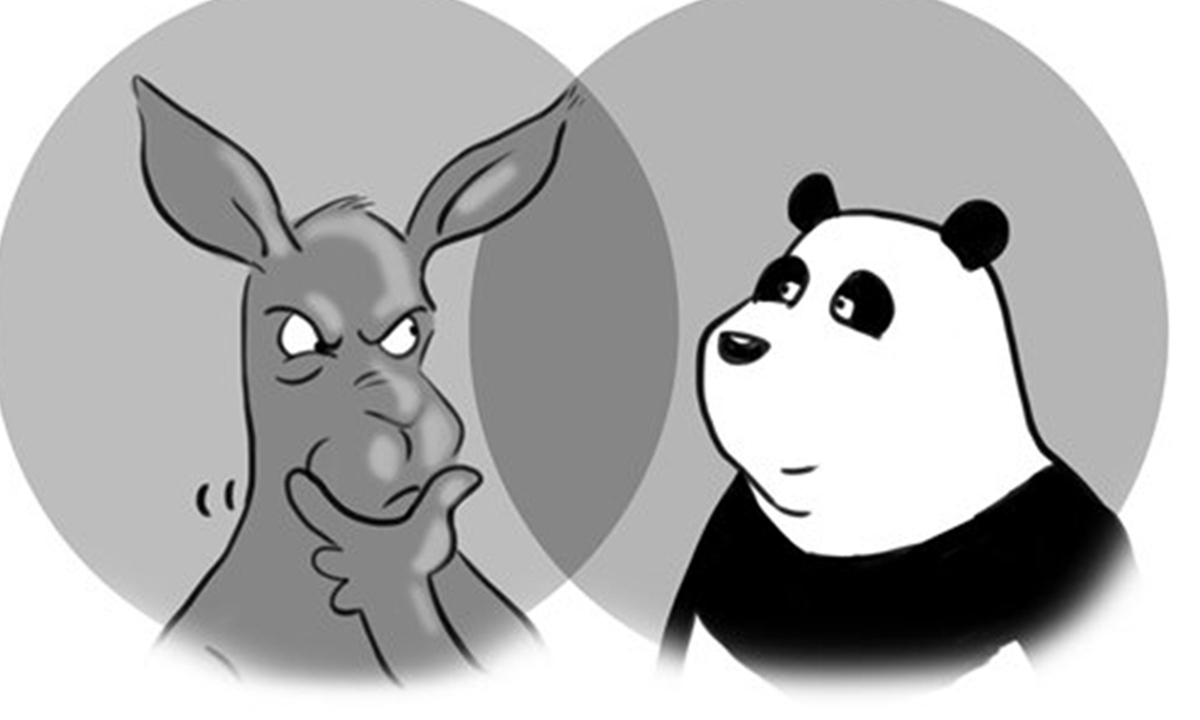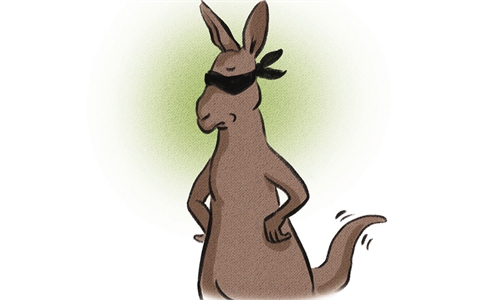
China Australia Illustration: Liu Rui/GT
With the end of 2020 and the start of 2021, media outlets and research institutes across the globe are busy summarizing and anticipating the future. Various negative and positive opinions define China-US ties. This is not the case for China-Australia ties, which many believe will be dour.
Hu Dan, deputy director of Australian Studies Center of Beijing Foreign Studies University, published an article in December 2020 noting, "China-Australia relations [are] doomed." Paul Kelly, editor-at-large of The Australian in September said in his op-ed, "Our [Australia's] China relationship needs help before it's too late." Jim Molan, former Australian Army major-general, in December even expressed his concern that Australia's "trade war" with China could soon step up to military conflict - he said that China had been "priming for war for a long, long time."
The writing on the wall seems clear for the pessimism. But whether and how can they be mended? Historically, despite spats between Beijing and Canberra, their cooperation and friendship have been generally smooth. Whereas the two countries have established diplomatic ties for over four decades, they have accumulated rich experiences with bilateral coordination efforts. Beijing and Canberra do not have any historical grievances or direct conflicts of interest. Instead, they confront with various common problems and threats on a unique cooperative basis. Chinese and Australian economies are complementary, and they also encounter common issues including trade protectionism and anti-globalization.
In recent years, Australia's domestic partisan fights and political factional differences have become more open and white-hot. Against this backdrop, the Australian government has to adjust its foreign policies - including its ever important China policy.
It is understandable that senses of insecurity and anxiety have been triggered again when the international and regional situations are profoundly changing. In this context, Australia's China policy has remarkably shifted in the opposite direction of China.
The scope of the concept "security" for China-related issues now is expanding. In Australia's strategic cognition, China has suddenly turned from a partner to a "threat" to its sovereign security. The assumption that China is a rival is emerging, and confronting China has become a new political correctness in Australia. As a result, even Chinese Australians have to constantly prove their loyalty to Australia. As former Australian prime minister Kevin Rudd was quoted as saying by Reuters on September 4, 2020 that "The atmosphere in Australia does not lend itself to a reasoned discussion on the China relationship, because you are automatically defined as either a hawk or a panda hugger."
High-level visits between the two sides have almost been halted. Economic cooperation is also hampered. Chinese investments in Australia have often been labeled threats to the country's national security. The number of investment projects thus decreased and the range of so-called sensitive fields is growing.
Chinese students, media, businessmen and immigrants are viewed by paranoid pundits and politicians of Australia as tools of the Chinese government to "intervene," "infiltrate in" Australia. In their eyes, there seems to be no difference among interacting, lobbying, influencing, and intervening. Any move could be a threat to Australia's democratic system and sovereign security.
Chinese State Councilor and Foreign Minister Wang Yi in December asked Australia to "consider seriously" what China means to it: Is China a threat or a partner to Australia? He further asked, "If Australia sees China as a threat, how can China-Australia relations improve?"
If China-Australia relations are to return to the normal track of development, Australia needs to think the above mentioned two questions seriously and rationally. It also needs to realize the changes in the regional and global landscape and where its interests lie.
Australia also has to consider whether its mind-set of hostility will alleviate its strategic anxiety. If Australia's China policy is to return to a normal, professional and constructive track, the Australian government should invite those who really understand diplomacy, China and China-Australia relations and those with a global vision to take part in policymaking. Those who blindly hype up the "China threat" and talk of war should not be included.
The author is a deputy director of South Pacific Research Study, Institute of Southeast Asian and Oceanian Studies, China Institutes of Contemporary International Relations. opinion@globaltimes.com.cn

